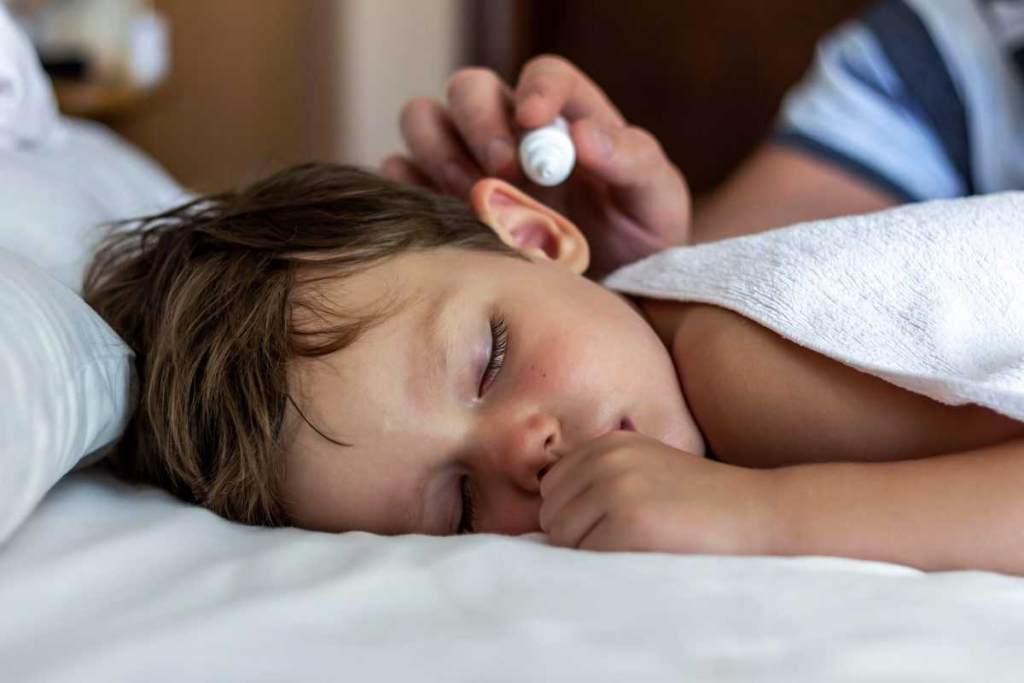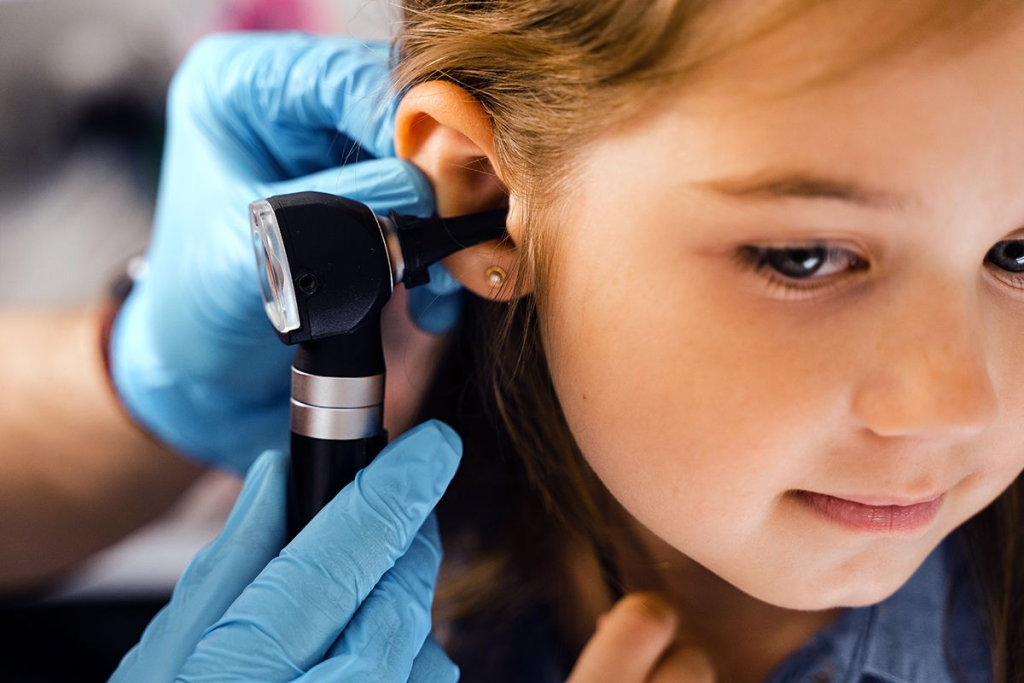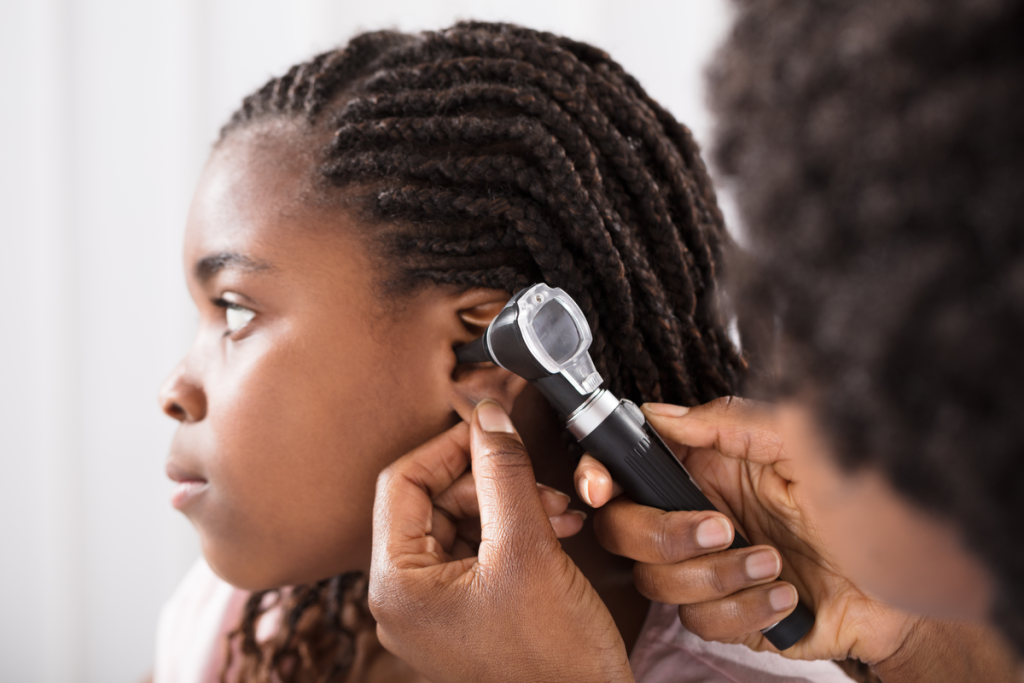
How long does an ear infection last? Ear infections are common in kids, and knowing when to get help is key. It’s worrying to see your child in pain from an ear infection, and quick action at urgent care is important when signs show up.
Spotting symptoms early helps avoid serious problems like hearing loss or developmental delays. Over 80% of kids have at least one ear infection by age 2.
As parents, we must watch for signs that mean our child needs urgent care. Look out for ongoing or severe ear pain, high fever, or hearing loss. Quick action can protect a child’s hearing and growth.
Ear infections are a big health problem for kids. It’s important to know why they happen and who is at risk. We’ll look at why kids get ear infections more than adults and what makes them more likely to get them.
Ear infections in kids can come from viruses or bacteria. The Eustachian tube dysfunction is a big part of it. It doesn’t drain fluid well, making it easy for infections to start. Cold and flu viruses can also block the Eustachian tube, leading to infections.

Children get ear infections more because of their body shape and how their immune system works. Their Eustachian tubes are shorter and more horizontal than adults’, making it easier for germs to get in. Also, their immune systems are not fully grown, making them more open to getting sick.
There are a few things that make a child more likely to get an ear infection. These include:
Knowing these causes and risk factors helps parents take steps to lower their child’s chance of getting an ear infection.
Knowing when to seek urgent care for ear infections in children is key. Ear infections can get worse and lead to serious problems if not treated quickly. We’ll show you the important signs that mean your child needs to see a doctor right away.
Ear pain is a common sign of an ear infection. If your child’s ear pain is severe or doesn’t go away with pain relievers, they need urgent care. This pain could mean a serious infection that needs a doctor’s help.
A high fever means the body is fighting a big infection. If your child’s temperature is over 102 °F (39 °C), they need urgent care. High fever can cause serious problems, so it’s important to watch it closely.
Seeing fluid or pus draining from the ear is a serious sign. It might mean the eardrum has a hole. This needs immediate medical help to avoid more problems and help it heal right.
If your child’s symptoms get worse after 48 hours even with home care, it’s a sign they need medical help. Urgent care can check and treat your child to help them get better.
Here’s a quick list of warning signs for urgent care:
Knowing these warning signs and acting fast can help your child get better and avoid serious problems. If you’re unsure about your child’s health, it’s always better to get medical help.
Ear infections show up differently in kids of different ages. It’s important for parents and caregivers to know the signs for each age. This helps them get help quickly.
Ear infections in infants can be hard to spot because they don’t show clear signs. Look out for:
Toddlers show a mix of symptoms, some more obvious than in infants. Watch for:
It’s vital to keep an eye on these signs, as toddlers can’t always tell us how they feel.
Preschoolers can usually tell us when they’re in pain. Look out for:
Knowing these signs helps parents and caregivers get help fast. This ensures their child gets the right care.
Knowing how long ear infections last in kids is key for parents. Ear infections, or otitis media, are common in children. Their length can change based on many things.

Ear infections can go away by themselves. Symptoms usually last from a few days to a week. But, watching your child closely is important because some infections can get worse.
Getting medical help can make ear infections shorter. Antibiotics can start making symptoms better in 48 to 72 hours. The whole treatment usually takes 7 to 10 days, depending on the infection and the antibiotic.
Several things can change how long it takes to get better from an ear infection. These include:
If complications happen, ear infections can last longer. Issues like fluid in the middle ear or mastoiditis might need more treatment. This could be more antibiotics or surgery. In these cases, the infection can last weeks or even months without the right care.
Parents should work closely with their doctor. This helps keep their child’s condition under control and prevents long-term problems.
Ear infections in kids worry parents a lot. It’s important to know if they can get better by themselves. We’ll look into how likely it is for ear infections to heal without help and what steps to take.
Watchful waiting is used for mild ear infections. It means watching the condition without antibiotics right away. This is because many ear infections get better in a few days. It’s usually suggested for kids over 2 with mild symptoms.
Parents should watch their child’s symptoms closely. If the symptoms get worse, or if there’s severe ear pain, high fever, or trouble hearing, seek medical help. Keeping a symptom diary is a good idea.
For mild ear infections, there are home care tips to help. Over-the-counter pain relievers like acetaminophen or ibuprofen can help with ear pain and fever. Always follow the dosage instructions.
Also, a warm compress on the ear can ease pain. Keeping the child’s head up while sleeping helps drain fluid. Make sure your child drinks lots of fluids to stay hydrated.
Not all ear infections will get better on their own. Kids under 2, those with severe symptoms, or those with recurring infections often need medical help. Signs like persistent high fever, severe ear pain, or discharge mean urgent medical care is needed.
If the infection is bacterial, antibiotics might be needed. It’s important to finish all the antibiotics as told by the doctor to clear the infection.
Ear infections in kids can come from many places, like their environment and who they meet. Knowing these sources helps us find ways to stop them.
Ear infections spread in different ways. Viral and bacterial infections are the main culprits. When a kid catches a cold or flu, viruses can move to their ears. Bacterial infections spread when a child touches someone who’s sick.
Some seasonal and environmental factors make ear infections more likely. Winter brings more colds and flu, which can lead to ear infections. Being around secondhand smoke and crowded places also raises the risk.
For kids with recurring ear infections, there are steps to take. These include:
By knowing how ear infections spread and using these prevention tips, parents can lower their child’s risk of getting them.
If your child has ear infection symptoms, knowing what to expect at an urgent care center can be reassuring. At urgent care centers, we provide complete care for children with ear infections. We make sure they get the right diagnosis and treatment.
When you visit an urgent care center for your child’s ear infection, we start with a detailed examination. Our healthcare team uses special equipment to look at the eardrum and check the ear’s condition. This helps us figure out how serious the infection is and what treatment is best.
Based on the diagnosis, we might give antibiotics for the ear infection, if it’s bacterial. Antibiotics help clear the infection and prevent complications. We also talk about pain relief options, like over-the-counter medicines, to help your child feel better while they get better.
It’s important to stick to the treatment plan to make sure your child fully recovers.
After the first treatment, we suggest follow-up care to make sure the infection is gone and to watch for any complications. This might mean another visit to the urgent care or a referral to a specialist. We also give advice on watching your child’s symptoms at home and when to see a doctor again.
By following these steps, we can help your child fully recover from the ear infection. This also helps prevent future infections.
Ear infections can harm a child’s hearing and development if not treated. We talked about signs that mean your child needs urgent care. These include severe ear pain, high fever, and fluid or pus from the ear.
It’s important for parents to watch for these symptoms. If you see them, get medical help right away. This can stop hearing loss and developmental problems.
To keep your child’s hearing safe, prevent ear infections. Know what causes them and how to lower the risk. Good hygiene, avoiding secondhand smoke, and keeping up with vaccines are key.
Urgent care centers can help with ear infections. If your child shows symptoms, go there fast. This way, your child gets the care they need to protect their hearing and development.
Ear infections in kids often come from viruses or bacteria. The eustachian tube, which connects the middle ear to the back of the throat, can get blocked. This lets bacteria or viruses grow and cause infection.
Kids get ear infections more because their eustachian tubes are shorter and easier to block. Their immune systems are also not fully grown, making them more open to infections.
You should seek urgent care if your child has severe or ongoing ear pain. Also, if they have a high fever (over 102 °F/39 °C), fluid or pus from the ear, or symptoms get worse after 48 hours.
Signs in infants include unexplained fever, being fussy, trouble sleeping, and pulling or tugging at their ears.
Without treatment, an ear infection can last a few days to a week. But, some cases might not get better or could get worse if not treated.
Mild ear infections might get better on their own with home care. But, if symptoms don’t get better or get worse, you need to see a doctor to avoid complications.
Doctors at urgent care centers check the eardrum and look at symptoms. They might use an otoscope to see the eardrum and find out if there’s an infection.
Treatment can include antibiotics, pain relief, and other care. How well treatment works depends on the infection’s cause and how bad it is.
To prevent ear infections, avoid cigarette smoke, breastfeed, and manage allergies. Also, keep your child clean and away from sick people to lower the risk.
With treatment, most kids get better from ear infections in a few days to a week. How fast they recover can depend on the treatment’s success and any complications.
Untreated ear infections can cause hearing loss, mastoiditis, and delays in speech or development. It’s important to get medical help quickly to avoid these problems.
Ear infections themselves aren’t contagious. But, the viruses or bacteria that cause them can spread. Keeping clean and staying away from sick people can help stop the spread.
Subscribe to our e-newsletter to stay informed about the latest innovations in the world of health and exclusive offers!
WhatsApp us